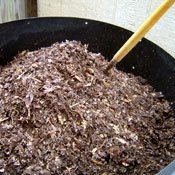Wednesday, May 16, 2012
Now that you presumably have your organicgarden planted, whether in pots on an apartment balcony or a larger space, you will want to nurture it with fertilizers.
Contrary to what those promoting chemical farming may say, there's a big difference between synthetic and natural fertilizers. Ammonia-based synthetic fertilizers kill microorganisms in the soil, kill earthworms that keep it aerated and fertilized, burn plant roots, and destroy humus. They can also poison drinking water, kill lakes and are even largely responsible for the giant dead zone in the Gulf of Mexico where there is no oxygen.
In short, chemical fertilizers "kill" the soil and do damage to the planet, too.
It's no wonder that synthetic fertilizers are prohibited from certified organic farming.
Synthetic fertilizers have three main nutrients: nitrogen (N), phosphorous (P) and potassium (K). When you look on the side of the package, it will say something like 13-13-13, which is the NPK content. This formula will cause your plants to look really great, initially, but after a few years, your soil will be hardpan and, essentially, dead.
Beyond NPK, there are 17 essential nutrients that plants need for healthy growth. Natural fertilizers provide these trace elements. How can you tell if one is missing? Here is sample of deficiencies:
• Magnesium, discoloration of leaves;
• Calcium, plant growth stops, blossom end rot;
• Sulfur, light greenish or yellowish;
• Zinc, thin, yellow leaves;
• Copper, wilting.
So, how do you fertilize your garden organically? Easy. For the long term, you can start by composting. Save anything but meat from your table, such as eggshells, vegetable scraps, fruit peels, coffee grounds and tea leaves.
You can compost these items in a pile outdoors, keeping it turned occasionally, or in a "spin" composter. After 60 to 90 days, it will be dark and crumbly and ready to add to the garden. Your garden is a growing medium and you want to treat it as a living being, nurturing it along. Increase and replace its fertility gradually, as it loses fertility by providing you with food.
So True!
Nice T-shirt I saw for sale at the Fair Trade Store in Fondren at Rainbow Plaza: "Gardening is cheaper than therapy, and you get tomatoes."
Chef to Plate
The High Noon Café in Rainbow Plaza is sporting notices that it supports the Gluten Intolerance Group of North America in its efforts to educate the public about food allergies. For more info, visit gluten.net.
Got an APP for That?
• Mother Earth News has a Grow Planner iPad App for $9.99 to help people plan their vegetable gardens, including specific crops for their regions and helpful rotations. Go to motherearthnews.com to download it.
• Want to know what chemicals are in your food? The Pesticide Action Network has a handy dandy online tool for that. Just click on the meat, fruit or vegetable item and it will tell you. Find it at http://www.whatsonmyfood.org
Jim PathFinder Ewing is the author of five books on energy medicine and eco-spirituality (Findhorn Press) published in English, French, German, Russian and Japanese. His next book, to be published in the fall, is titled "Conscious Food: Sustainable Growth, Spiritual Eating." Find Jim on Facebook, follow him @edibleprayers or visit http://www.blueskywaters.com.
